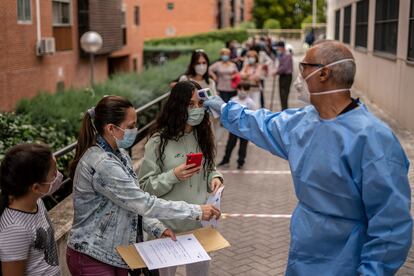Health Ministry reports 261 coronavirus deaths, the biggest figure so far from Spain’s second wave
After a slight improvement on Monday, Madrid’s data has once again got worse, with 40.5% of intensive care beds occupied by Covid-19 patients


After several days of falls, the number of new coronavirus cases reported by the central Health Ministry in its daily report on the epidemic shot up on Tuesday. Of the 11,988 new infections diagnosed, 5,187 of them (43%) correspond to Madrid. In Monday’s report, this percentage was 28% and on Friday it was 22%. The new cases in the region represent the highest figure so far in this second wave of the health crisis.
That was not the only record figure to be seen in Tuesday’s data. The number of Covid-19-related fatalities to be added to the total came in at 261, which is the highest figure since the first wave of the virus was brought under control between March and May thanks to Spain’s national lockdown, one of the strictest in the world. Of these, 120 were from the Madrid region, also a new high in this second wave.
The Health Ministry’s official Covid-19 death toll stands at 32,486, but this does not include the thousands of undiagnosed fatalities from the first wave. According to data from Spain’s civil registries, there have been 53,000 excess deaths in the country between March and September. The official number of confirmed cases in the country stands at 825,410.

Tuesday’s report arrived a day after Health Minister Salvador Illa and Fernando Simón, the director of the Health Ministry’s Coordination Center for Health Alerts (CCAES), cast doubts about the data being reported by the Madrid regional government, suggesting that the lower infection numbers could be due to reporting delays and problems with properly incorporating new rapid antigen test results into its figures. Speaking at a press conference on Monday to discuss the latest figures, the pair said that time was needed to determine whether there was an issue. “Right now I wouldn’t venture to say whether the city of Madrid is getting better or worse,” said Simón.
On Friday, the Madrid regional government reluctantly implemented perimetral lockdowns in 10 of its cities, including the Spanish capital, as well as introducing other restrictions that have been forced on it by the central administration, run by the Socialist Party (PSOE) in coalition with junior partner Unidas Podemos. The two governments have been locked in a battle in recent weeks, with the central Health Ministry insisting on introducing stricter measures to get the epidemiological situation in Madrid under control, and the regional government reluctant to do so given the damage such measures will cause to the economy. Madrid has already filed an appeal against the restrictions in the Spanish High Court, the Audiencia Nacional, on the basis that they are an encroachment of its powers.
What’s more, the Madrid government on Tuesday called the central administration “irresponsible” for throwing into doubt its data on the epidemic, accusing it of encouraging a “message of fear.” “When the data for Madrid was good in July, it was suspect,” wrote regional premier Isabel Díaz Ayuso of the conservative Popular Party (PP) on Twitter yesterday. “It got worse and it was credible until it got better again. And instead of responsibility, they opt for a message of fear with Madrid.”

But the figures released on Tuesday indicate that the improvements seen in Monday’s report have not continued. The 14-day cumulative number of coronavirus cases per 100,000 inhabitants – the principal indicator used to compare the epidemiological situation between regions, and the main parameter established by the central government and regional administrations for the implementation of restrictions – has risen sharply in Madrid. According to Tuesday’s report, it went from 587 to 710 in a single day, way above the national average of 273. As such, the region has returned to levels similar to those seen in the last two weeks.
The second region with the highest 14-day cumulative number of coronavirus cases per 100,000 inhabitants is Navarre, with 673, although this figure has improved slightly compared to previous days. The next most-affected regions are La Rioja (386), Castilla y León (383) and Castilla-La Mancha (376). Those with the best situation are the Canary Islands (99), Valencia (104) and Galicia (108).
The Health Ministry also reported 883 new coronavirus patients in Spain’s hospitals, with 71 requiring intensive care unit (ICU) treatment. The number of ICU beds occupied by coronavirus patients has fallen slightly, from 18.3% across Spain to 17.7% from Monday to Tuesday. Madrid continues to be the region with the highest ICU bed occupation, at 40.5%. This is a slight fall compared to Monday’s figure. La Rioja has managed to get this percentage down, from 42% on September 22 to 25% on Tuesday.
English version by Simon Hunter.
Tu suscripción se está usando en otro dispositivo
¿Quieres añadir otro usuario a tu suscripción?
Si continúas leyendo en este dispositivo, no se podrá leer en el otro.
FlechaTu suscripción se está usando en otro dispositivo y solo puedes acceder a EL PAÍS desde un dispositivo a la vez.
Si quieres compartir tu cuenta, cambia tu suscripción a la modalidad Premium, así podrás añadir otro usuario. Cada uno accederá con su propia cuenta de email, lo que os permitirá personalizar vuestra experiencia en EL PAÍS.
¿Tienes una suscripción de empresa? Accede aquí para contratar más cuentas.
En el caso de no saber quién está usando tu cuenta, te recomendamos cambiar tu contraseña aquí.
Si decides continuar compartiendo tu cuenta, este mensaje se mostrará en tu dispositivo y en el de la otra persona que está usando tu cuenta de forma indefinida, afectando a tu experiencia de lectura. Puedes consultar aquí los términos y condiciones de la suscripción digital.








































